- Home
- Jacqueline Wilson
Jacky Daydream Page 16
Jacky Daydream Read online
Page 16
‘It was OK, wasn’t it?’ said my new friend Christine.
‘It wasn’t too bad,’ said Marion.
‘I liked that poem in the English part,’ said Ann.
‘My pen went all blotchy – do you think it matters?’ said Cherry.
The boys were all boasting that it was easy-peasy, except Julian, who modestly kept quiet.
I kept quiet too.
‘How did you get on, Jacky?’
‘I thought it was horrible,’ I sniffed.
‘Oh, rubbish. You’re one of the cleverest. I bet you’ll come out top,’ said Cherry.
‘No I won’t! I couldn’t do half of the arithmetic,’ I said.
‘Neither could I,’ said Christine comfortingly. ‘But you’ll have done all right, just you wait and see.’
Well, I waited. We all had to wait months until the results came through. Then Mr Branson stood at the front of the class with the large dreaded envelope. He opened it up with elaborate ceremony and then scanned it quickly. We sat up straight, hearts thumping. He took our class register and went down the long list of our names, ticking several. Every so often his hand hovered in the air and he made his mouth an O, hissing with horror. He had the register at such an angle that we had no way of knowing whether he was up in the As or down in the Ws. We just had to sit there, sweating.
Mr Branson cleared his throat.
‘Well, well, well,’ he said. ‘A lot of shocks and surprises here. Well done, some of you. The rest of you should be thoroughly ashamed. Very well, Four A, pin back your ears. I will now go through the register and tell you whether you have – or have not – passed your eleven-plus examination.’
He paused. We waited. I was Jacqueline Aitken then, the first child on the register.
‘Jacky Aitken . . . you have not passed your eleven plus,’ said Mr Branson.
I sat still, the edge of the desk pressing into my chest. Mr Branson glared at me, and then worked his way down the register. I couldn’t concentrate. I heard Robert had passed, Raymond had passed, Julian of course had passed – but I didn’t catch any of the girls’ names. I was too concerned with my own terrible failure.
I wanted to cry, but there was no way in the world I was going to let Mr Branson see me weeping. I even managed to meet his eye.
I could face up to him but I didn’t know how I was going to face Biddy and Harry. Biddy had said all the right things. She had tried not to put too much pressure on me. She’d told me simply to do my best. But I hadn’t done my best, I’d done my worst. I’d failed. She hadn’t failed. She’d passed her eleven plus and gone to Tiffins Girls.
Harry had been sent to a technical school so he was particularly keen for me to have a grammar school education. He’d tried tutoring me at home, working our way through intelligence tests and those terrible men-digging-holes problems. He’d start with his kind voice and he’d promise he wouldn’t get cross. He said if there was anything at all I didn’t understand, I had only to say and he’d go over it again for me. He’d go over it – again and again and again – and I’d struggle to take it all in, but the words started to lose all their sense and the figures were meaningless marks on the page.
‘You’re not listening, Jac!’ Harry would say.
‘I am. I am. You said you wouldn’t get cross.’
‘I’m not cross,’ Harry insisted, sighing irritably.
He’d say it all again, s-l-o-w-l-y, as if that would somehow make a difference. I’d be just as baffled, and make silly mistakes, until Harry would suddenly lose it.
‘Are you a MORON?’ he’d shriek, his fist thumping the page.
I felt I was a moron where maths was concerned, but no one seemed to understand that I wasn’t one deliberately. Harry spent hours and hours trying to coach me even though it had now proved a total waste of time.
I had to tell them as soon as possible to get it over with. I couldn’t ring them. Mobiles weren’t invented. We didn’t even have an ordinary land line at home. Harry possibly had one in the London office but I didn’t know the number. I didn’t know Biddy’s number either, but I knew where her office was. I decided to miss my school dinner and run the two miles to her work to tell her the terrible news.
Poor Biddy. There she was, having a cup of tea and writing beautiful entries in the big accounts book when I burst in on her. Her pen wavered, her tea spilled, but she didn’t care. She thought I’d passed. Surely that was the only reason I’d run such a long way at dinner time.
‘Oh, Jac!’ she said, holding out her arms, her whole face lit up with joy at the thought of her daughter going to grammar school.
‘No, no – I’ve failed!’
She was valiant. She kept right on smiling and gave me the hug.
‘Never mind,’ she said. ‘Never you mind. There now.’ She paused. ‘Did you get given a second chance?’
In those days they let all borderline eleven plus failures sit a further exam in the summer, and those who passed had their pick of the secondary schools. You couldn’t get into Tiffins, but it still wasn’t to be sniffed at.
I’d been in such a state I hadn’t taken it in. I had been given a second chance. I went along to sit the exam a couple of months later. Ironically, we were all sent to Tiffins to do the paper. It was more scary not being in our own environment. No one told us where the lavatories were, so we all fidgeted desperately in our seats as time went by. I can’t remember any men digging holes this time. Perhaps we only had to do an intelligence test. Anyway – this time I passed.
* * *
The twins in Double Act sit an entrance exam to go to the boarding school Marnock Heights. Which twin passes, Ruby or Garnet?
* * *
It’s Garnet – although everyone expected Ruby to pass.
We couldn’t believe it. We thought Miss Jeffreys had got us mixed up.
‘She means me,’ said Ruby. ‘She must mean me.’
‘Yes, it can’t be me,’ I said. ‘Ruby will have got the scholarship.’
‘No,’ said Dad. ‘It’s definitely Garnet.’
‘Let me see the letter!’ Ruby demanded.
Dad didn’t want either of us to see it.
‘It’s addressed to me,’ he said. ‘And it’s plain what it says. There’s no mix-up.’
‘She’s just got our names round the wrong way,’ Ruby insisted. ‘It’s always happening.’
‘Not this time,’ said Rose.
‘Look, it’s absolutely not fair if she’s read the letter too, when it’s got nothing to do with her. She’s not our mother,’ said Ruby.
‘No, but I’m your father, and I want you to calm down, Ruby, and we’ll talk all this over carefully.’
‘Not till you show me the letter!’
‘I’d show both the girls the letter,’ said Rose. ‘They’re not little kids. I think they should see what it says.’
So Dad showed us.
It was like a smack in the face.
Not for me. For Ruby.
Poor Ruby – and poor Garnet too! I hate the next bit, when Ruby refuses to have anything to do with Garnet. I’m glad they make friends again just before Garnet goes off to boarding school. I’ve often wondered what happens next!
29
Fat Pat
I STILL HAD imaginary friends when I was in the last year of Latchmere but I had many real friends too. I still walked to and from school with Cherry but I didn’t play with her so much. I didn’t play with Ann any more either. She had a new best friend, a tall rangy girl called Glynis. They were always going off together and playing their own elaborate secret games. Ann was prettier than ever, her hair long and glossy and tied with bright satin bows. She wore wonderful short floral dresses with smocking and frilled sleeves. She had frills all over – when she ran, you caught a glimpse of her white frilly knickers. She was the girl we all wanted to be.
Poor Pat was the girl we all shunned. She was the fat girl, Fat Pat, Chubby Cheeks, Lardy Mardy, Greedy Guts, Two-Ton Tessie, Elephant
Bum. She wore sensible loose dresses to hide her bulk. It must have been torture for her to have to take off her dress publicly and do PT in her vest and vast knickers. If she’d been half her size she’d have been considered pretty. She had very pink cheeks and long blonde straight hair, almost white. Her plaits were always incredibly neat, never a hair out of place, her ribbons tied up all day long.
She had the most beautifully neat handwriting too. She’d lie half across her page, her chubby hand moving slowly, her pink tongue peeping out between her lips – so much effort to make those smooth, even, blue letters on the page.
I don’t think she had any friends. She wasn’t particularly teased in the playground. She was simply shunned.
I shunned her too in front of the others, but if we happened to fetch up together – before school in the classroom, walking down the corridor, in the girls’ toilets – I’d make a few hesitant overtures.
‘I hope old Brandy Balls isn’t in a bad mood today!’
‘Can you work out how to do those problems? I haven’t got a clue!’
‘Hurray, it’s raining! No PT! I do hope we can do country dancing instead.’
She’d smile at me and murmur something in reply. One day, when I found her combing the tails of her sleek plaits in the cloakroom, I said, ‘You’re so lucky to have such lovely long hair.’
I said it because I genuinely thought she had lovely hair. I was also trying to be kind, because Pat rarely got compliments. Her cheeks went a little pinker. She smiled at me and said nothing, but there was such a wry and wistful expression on her face. She knew why I was saying it. She felt pleased but patronized. Why should she feel humbly grateful for a crumb of kindness? Why should she be singled out to be the sad girl in the class? She didn’t seem to eat more than anyone else. She wasn’t lazy. She puffed along heroically after us when we were made to run round and round the playground.
‘I can’t help being fat,’ she said. ‘It’s my metabolism.’
I didn’t know what her metabolism was. I imagined it like a night monster, crouching on her chest in the small hours, funnelling double cream and melted chocolate up her nostrils as she slept.
I nodded sympathetically. ‘It doesn’t matter, being fat,’ I said, though we both knew it mattered tremendously.
Pat wasn’t taken seriously by anyone at school. She wasn’t allowed to be Pat the Person, with her own personality. She was simply Fat Pat, a sad cartoon girl waddling in our midst.
Then she suddenly wasn’t in our midst any more. We came back to school after a half-term holiday and she wasn’t there. Her seat was empty. Her name wasn’t called in register. We didn’t really think anything of it. Not until we filed into assembly and saw Mr Pearson standing on the stage, looking very grave.
‘I’ve got some very sad news for you, children. I’m sure you all know Pat in Mr Branson’s class. I’m afraid she passed away during the holiday. Our thoughts are with her poor parents. Let us all say a prayer for Pat.’
I shut my eyes and bent my head, utterly stunned. I hadn’t really known anyone before who had died. Harry’s mother had died when I was a baby, Harry’s father had died when I was a small child, but they were old to me. Pat was my age. She was poor Fat Pat, the girl I chatted to in the toilets, the girl I shamefully ignored in the classroom. But now she’d done something as extraordinary and dramatic and grown up as dying.
I thought of her squashed into a white coffin, her plaits tied with white satin, dressed in a long white nightie. I wondered if her cheeks would still be pink. I thought of her lying in her coffin week after week after week, getting thinner and thinner and thinner until she dieted down to a skeleton. I started to shake. I wished I’d been kinder to her. I wished I’d been her friend all the time. I hadn’t properly known her so I couldn’t really miss her, but it felt as if I did.
I don’t think anyone told us what she died of. I have a vague feeling it might have been an asthma attack, but I don’t remember her ever using an inhaler. Maybe children didn’t have them in those days.
We didn’t talk about Pat amongst ourselves. I think we all felt guilty. We tried to forget her, but she’s there in our form photograph, smiling bravely, as if she was just an ordinary happy-go-lucky member of our class. And now, when I look at that faded black and white photo, I realize she wasn’t even that fat. I don’t need to look at the photo to remember her. I often think about her even now.
* * *
I have a very cheery, confident fat boy in three of my books. What is his nickname – and can you think of all three titles?
* * *
It’s Biscuits, and he appears in Cliffhanger, Buried Alive and Best Friends.
I suppose I’m still a bit greedy, if I’m absolutely honest. Not quite as greedy as Biscuits though. Well, his real name is Billy McVitie, but everyone calls him Biscuits, even the teachers. He’s this boy in our class at school and his appetite is astonishing. He can eat an entire packet of chocolate Hob Nobs, munch crunch, munch crunch, in two minutes flat.
Biscuits is so kind and funny and positive – and a marvellous friend. He’s very supportive of Tim when they’re on their adventure holiday in Cliffhanger, and they have even more fun on a seaside holiday in Buried Alive.
I decided I wanted to find out more about dear old Biscuits, so he popped up again in Best Friends. Gemma gives him a hard time, but eventually appreciates him. Biscuits makes brilliant cakes, including a wonderful chocolate biscuit cake. One Christmas my lovely friend and illustrator Nick Sharratt made me a fantastic chocolate biscuit cake, very rich and munchy, studded with red glacé cherries. My mouth’s watering remembering it!
30
Christine
I MADE A new friend in Mr Branson’s class. She was called Christine, a tall girl with a high forehead and glossy brown hair cut short and clipped back with tortoiseshell hairslides. She went glossy brown all over every summer, effortlessly and evenly tanning, while I went red and blotchy and then peeled.
Christine was six months older than me. She’d been in the class above but now she’d been kept back to repeat a year. She was bright as a button but there were problems at home. I don’t think Christine had even sat the eleven plus last year. She couldn’t move on to a secondary school because they were all too far away. Christine needed to dash home every lunch time to see her mother.
‘My mum’s dying,’ Christine told me, as soon as we’d made friends.
We huddled up together in the playground, arms round each other, while she told me all about it. Christine told it straight, no soft euphemisms, though the teachers murmured about her mother being ‘poorly’.
‘She’s got cancer,’ said Christine. ‘She’s had it for ages and now it’s so bad she can’t do anything. She just lies on the sofa downstairs. She’s got so thin and she looks so old, not really like my mum any more. But she’s still my mum inside, even though she gets muddled and sleepy with all the drugs she has to take.’
‘The drugs?’ I whispered.
‘For the pain. She gets in such awful pain,’ said Christine. She said it matter-of-factly, but her eyes watered. ‘I give her her dose at lunch time and I take her to the toilet and fix her a drink. She sleeps a bit then, but the drugs wear off. She’s often crying by the time I get home. It’s the worst pain ever.’
I tried to think what the worst pain ever must be like. I thought of all my tummy upsets, when I sometimes doubled up involuntarily. I imagined that much worse. I wondered how I would cope if it was my mum.
‘Isn’t there anyone else to help look after her?’ I asked, taking Christine’s hand.
‘There’s my dad, but he’s out at work in London all day,’ said Christine. (He was a civil servant and vaguely knew my dad.) ‘Anyway, they don’t really get on now. Daddy’s got this girlfriend. But don’t tell anyone.’
I nodded. This was something I understood.
‘My mum’s got a boyfriend. Don’t tell either, OK?’
‘I’ve got a big sister, but
she keeps having heaps of rows with my dad and staying out late. She mostly stays round at her boyfriend’s house. It’s better when she does, it’s more peaceful.’
‘But it’s not fair on you, having to do everything for your poor mum.’
‘I don’t mind. I want to do it. I want to help her,’ said Christine.
‘What about Patricia?’ I said. ‘Does she help too?’
She was Christine’s sister in the year below, a fair, giggly girl, often acting a little wildly in the playground with her friend Madeleine, letting off steam.
‘Patricia tries but she’s not that good at making Mummy comfortable. And she gets too upset. She’s just a baby,’ said Christine, as if there was a lifetime between nine and eleven.
So Christine soldiered on, day after day, nursing her dying mother, doing most of the shopping, the washing, the ironing. She did this willingly, without complaint. The only thing she complained about bitterly was the fact that her mother was dying.
‘It’s not fair,’ she said, clinging to me. ‘She’s so kind and gentle and lovely. Why should she have to die so young? I asked the vicar at our church and he said it’s very sad but it’s God’s will. Well, I think God’s a terrible person if he wants to make Mum suffer so much. I hate God.’
We stared at each other, both of us shocked at what she’d said. We waited for the thunderbolt to come sizzling out of the sky. Nothing happened.
‘I don’t blame you,’ I said lamely. ‘Oh, Christine, it isn’t fair at all.’
I held her and rocked her. She cried a little and I cried too. Then we realized we were alone in the playground. Afternoon school had already started.
‘Oh, lummy, I’ve made us late,’ said Christine.
‘Never mind.’
‘Brandy Balls will go barmy.’
‘Who cares,’ I said, patting her.
We went into the classroom, holding our breath. Mr Branson was writing something on the blackboard. He stopped as we came in. He broke his chalk in two. He aimed one half at me, the other at Christine. He hit both of us on the temple where it hurt most.

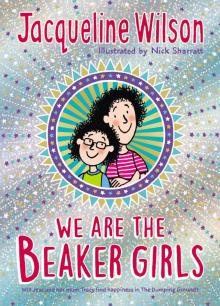 We Are the Beaker Girls
We Are the Beaker Girls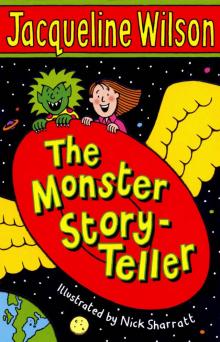 The Monster Story-Teller
The Monster Story-Teller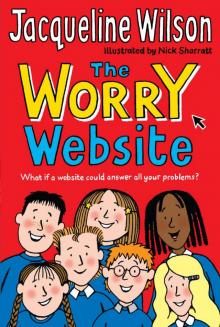 The Worry Website
The Worry Website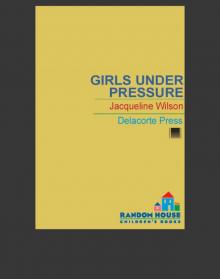 Girls Under Pressure
Girls Under Pressure Little Darlings
Little Darlings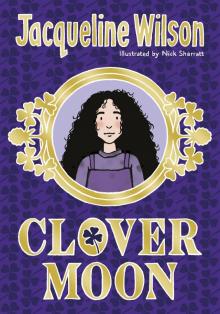 Clover Moon
Clover Moon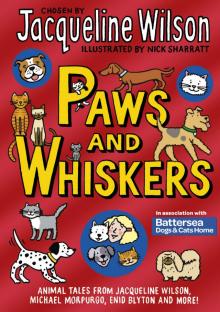 Paws and Whiskers
Paws and Whiskers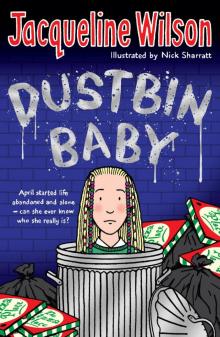 Dustbin Baby
Dustbin Baby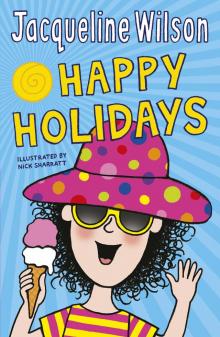 Jacqueline Wilson's Happy Holidays
Jacqueline Wilson's Happy Holidays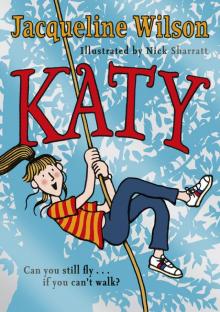 Katy
Katy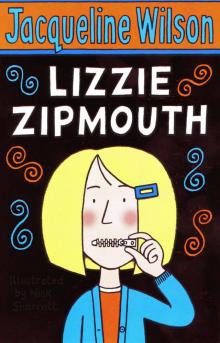 Lizzie Zipmouth
Lizzie Zipmouth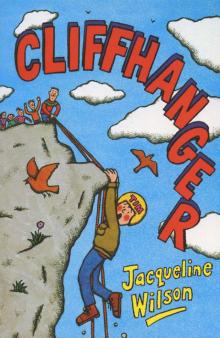 Cliffhanger
Cliffhanger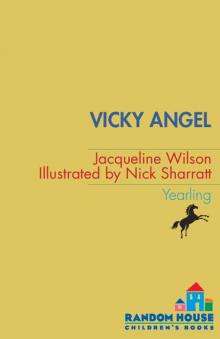 Vicky Angel
Vicky Angel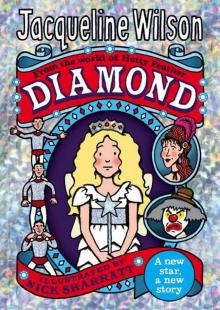 Diamond
Diamond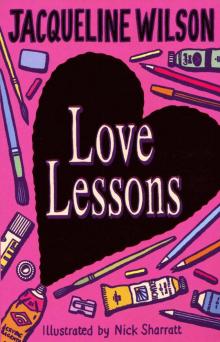 Love Lessons
Love Lessons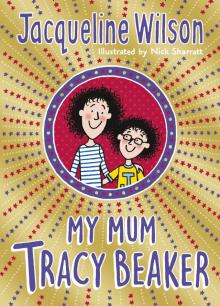 My Mum Tracy Beaker
My Mum Tracy Beaker Lola Rose
Lola Rose Jacky Daydream
Jacky Daydream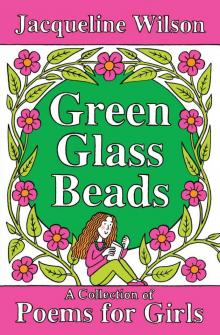 Green Glass Beads
Green Glass Beads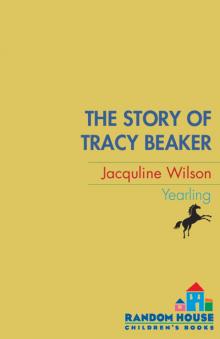 The Story of Tracy Beaker
The Story of Tracy Beaker Clean Break
Clean Break Longest Whale Song
Longest Whale Song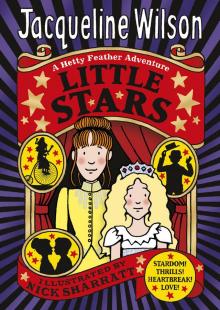 Little Stars
Little Stars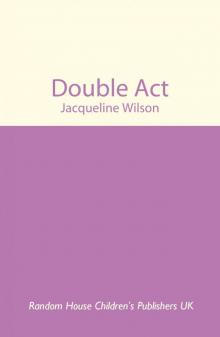 Double Act
Double Act The Suitcase Kid
The Suitcase Kid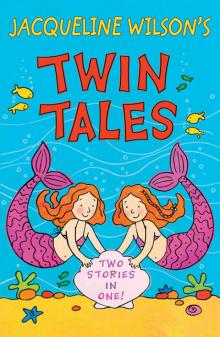 Twin Tales
Twin Tales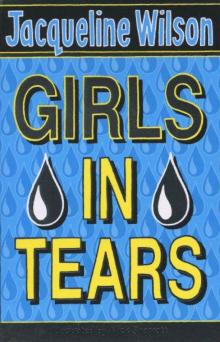 Girls in Tears
Girls in Tears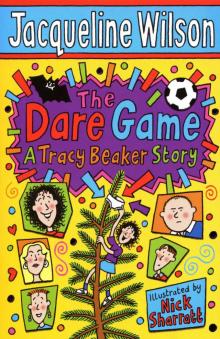 The Dare Game
The Dare Game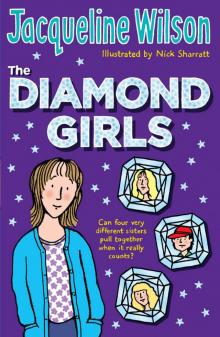 Diamond Girls
Diamond Girls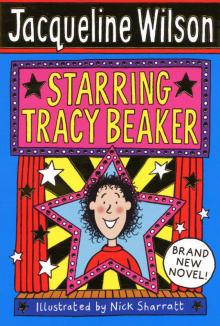 Starring Tracy Beaker
Starring Tracy Beaker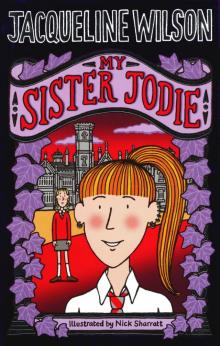 My Sister Jodie
My Sister Jodie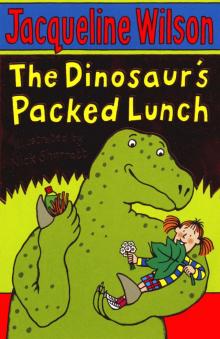 The Dinosaur's Packed Lunch
The Dinosaur's Packed Lunch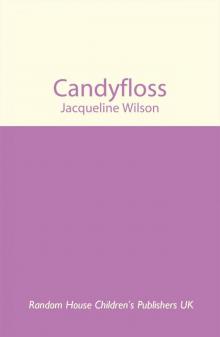 Candyfloss
Candyfloss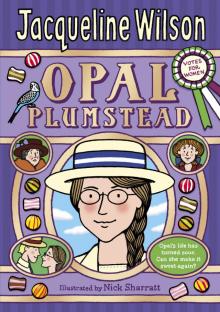 Opal Plumstead
Opal Plumstead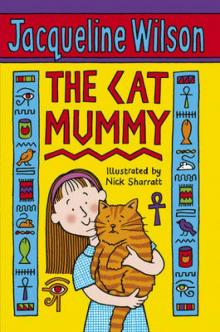 The Cat Mummy
The Cat Mummy Werepuppy and the Werepuppy on Holiday
Werepuppy and the Werepuppy on Holiday Hetty Feather
Hetty Feather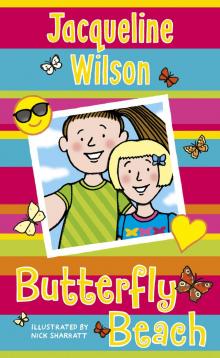 Butterfly Beach
Butterfly Beach Midnight
Midnight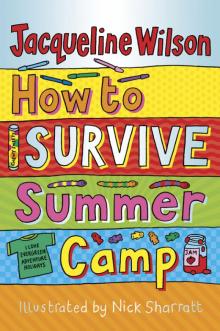 How To Survive Summer Camp (ePub)
How To Survive Summer Camp (ePub)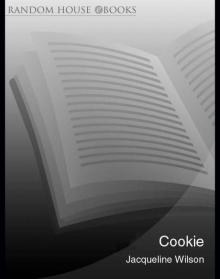 Cookie
Cookie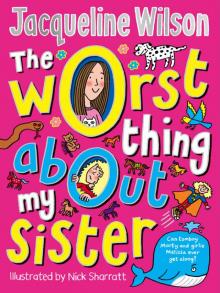 The Worst Thing About My Sister
The Worst Thing About My Sister Bad Girls
Bad Girls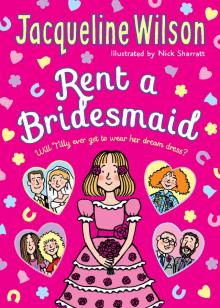 Rent a Bridesmaid
Rent a Bridesmaid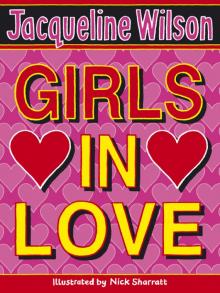 Girls in Love
Girls in Love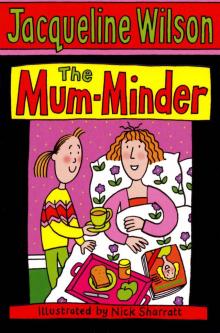 The Mum-Minder
The Mum-Minder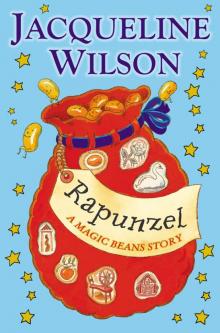 Rapunzel
Rapunzel Lottie Project
Lottie Project Best Friends
Best Friends Video Rose and Mark Spark
Video Rose and Mark Spark Glubbslyme
Glubbslyme Girls Out Late
Girls Out Late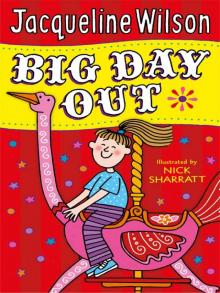 Big Day Out
Big Day Out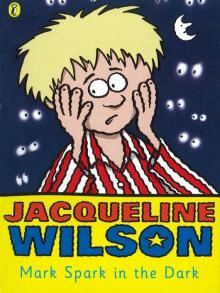 Mark Spark in the Dark
Mark Spark in the Dark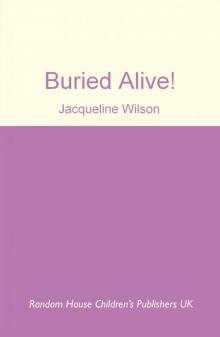 Buried Alive!
Buried Alive!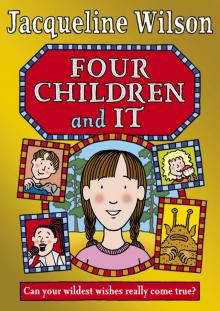 Four Children and It
Four Children and It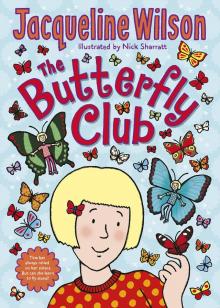 The Butterfly Club
The Butterfly Club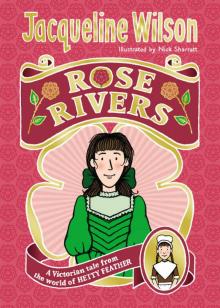 Rose Rivers
Rose Rivers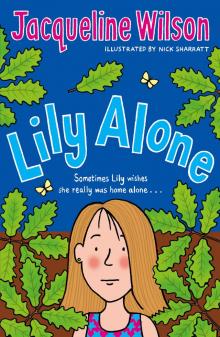 Lily Alone
Lily Alone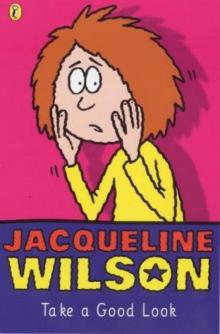 Take a Good Look
Take a Good Look My Secret Diary
My Secret Diary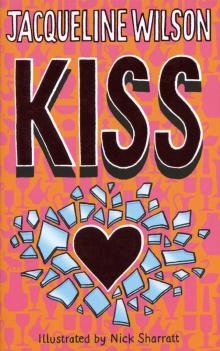 Kiss
Kiss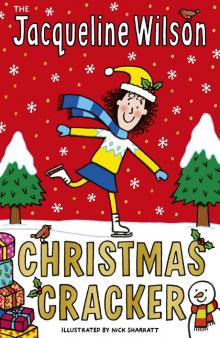 The Jacqueline Wilson Christmas Cracker
The Jacqueline Wilson Christmas Cracker The Worry Web Site
The Worry Web Site Emerald Star (Hetty Feather)
Emerald Star (Hetty Feather) The Bed and Breakfast Star
The Bed and Breakfast Star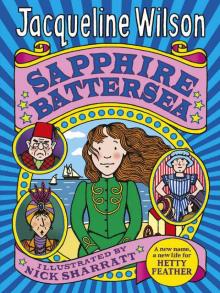 Sapphire Battersea
Sapphire Battersea Cat Mummy
Cat Mummy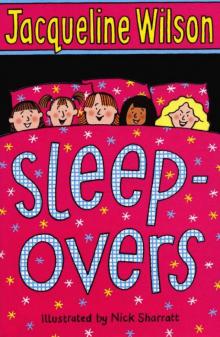 Sleepovers
Sleepovers Dare Game
Dare Game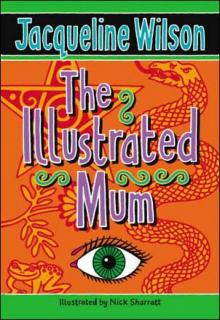 The Illustrated Mum
The Illustrated Mum Secrets
Secrets